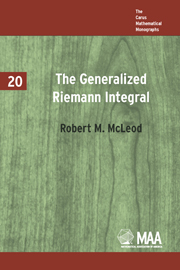Book contents
- Frontmatter
- PREFACE
- LIST OF SYMBOLS
- Contents
- INTRODUCTION
- CHAPTER 1 DEFINITION OF THE GENERALIZED RIEMANN INTEGRAL
- CHAPTER 2 BASIC PROPERTIES OF THE INTEGRAL
- CHAPTER 3 ABSOLUTE INTEGRABILITY AND CONVERGENCE THEOREMS
- CHAPTER 4 INTEGRATION ON SUBSETS OF INTERVALS
- CHAPTER 5 MEASURABLE FUNCTIONS
- CHAPTER 6 MULTIPLE AND ITERATED INTEGRALS
- CHAPTER 7 INTEGRALS OF STIELTJES TYPE
- CHAPTER 8 COMPARISON OF INTEGRALS
- REFERENCES
- APPENDIX Solutions of In-text Exercises
- INDEX
CHAPTER 6 - MULTIPLE AND ITERATED INTEGRALS
- Frontmatter
- PREFACE
- LIST OF SYMBOLS
- Contents
- INTRODUCTION
- CHAPTER 1 DEFINITION OF THE GENERALIZED RIEMANN INTEGRAL
- CHAPTER 2 BASIC PROPERTIES OF THE INTEGRAL
- CHAPTER 3 ABSOLUTE INTEGRABILITY AND CONVERGENCE THEOREMS
- CHAPTER 4 INTEGRATION ON SUBSETS OF INTERVALS
- CHAPTER 5 MEASURABLE FUNCTIONS
- CHAPTER 6 MULTIPLE AND ITERATED INTEGRALS
- CHAPTER 7 INTEGRALS OF STIELTJES TYPE
- CHAPTER 8 COMPARISON OF INTEGRALS
- REFERENCES
- APPENDIX Solutions of In-text Exercises
- INDEX
Summary
Two complementary aspects of integration over multidimensional intervals are treated in this chapter. First, in Section 6.1, it is assumed that ∫Iƒ exists. Conclusions are asserted concerning the existence of iterated integrals and their equality to ∫Iƒ. This is Fubini's theorem. The proof is postponed to Section S6.4. Section 6.2 attacks the complementary question of what can be said about existence of ∫Iƒ from the known properties of an iterated integral. Some necessary conditions are developed which permit the conclusion that ∫Iƒ does not exist. Other conditions are found which allow the conclusion that ∫Iƒ exists to flow from properties of an iterated integral. The behavior of the iterated integral as a function of intervals is of particular interest in these necessary conditions and sufficient conditions for integrability.
Fubini's theorem as stated in Section 6.1 and proved in Section S6.4 does not assume absolute integrability. Under the more restrictive hypothesis of absolute integrability an entirely different kind of proof can be given. Such a proof builds up from characteristic functions through simple functions to absolutely integrable functions. It uses convergence theorems in its last stage. The details of this approach are left as Exercise 11 at the end of the chapter. The proof given in Section S6.4 uses as its main ideas the definition of the integral and the Cauchy criterion. It is simple in concept but requires many details.
- Type
- Chapter
- Information
- The Generalized Riemann Integral , pp. 149 - 176Publisher: Mathematical Association of AmericaPrint publication year: 1980



